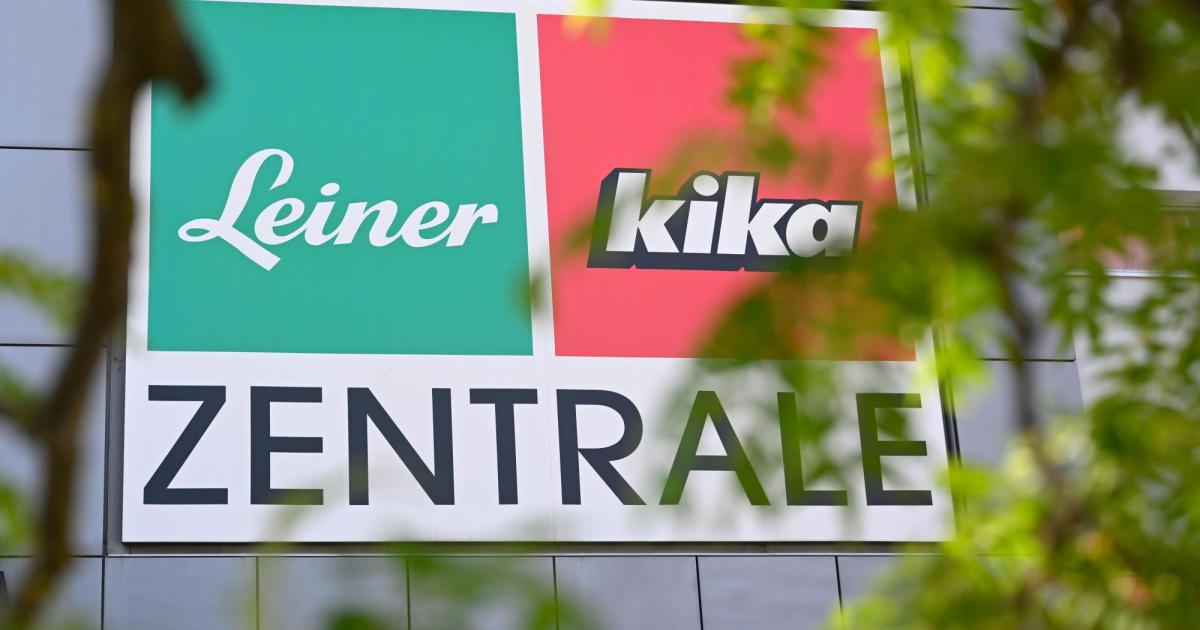At the Bankruptcy of Kika/Leiner there are thousands of customers looking for their Deposits fall over. There are also many flood victims following the extreme flooding in Lower Austria.
After September 15th, the now insolvent furniture chain launched a flood relief campaign with a 20 percent immediate discount. People involved in the bankruptcy spoke to the APA of “an above-average number of hardship cases”. There is no consumer protection here.
On September 20th, Leiner advertised on Facebook as follows: “The extreme storms have hit many of us hard and the road back to normality is often long and challenging. In this difficult situation, we would like to stand by you and support you,” and more : “Together we can do it!”
But nothing came of the “together” – on the contrary, the damage became even greater when Kika/Leiner filed for bankruptcy on November 12th. This week, the liquidator informed the affected customers whether he was still fulfilling their purchase contracts or not. According to media reports, it’s about 10,000 to 20,000 down payments, for example for kitchens or sofas. The liquidator himself does not want to comment on the number of customers affected.
Down payments are legally permitted shortly before bankruptcy
According to insolvency experts, it is okay from a legal perspective for a company to accept down payments a few weeks before bankruptcy. If a company determines that it is insolvent, it has up to 60 days to attempt to reorganize before having to file for bankruptcy. During this time, the company is allowed to continue its business as normal, including accepting deposits.
Several media outlets have picked up on individual fates in recent weeks. The ORF program “Thema” reported on an older couple from Sieghartskirchen in Lower Austria who paid 21,270 euros for a new kitchen and dining room after the flood. “Today” described the case of a single mother from Kirnberg an der Mank who paid 19,000 euros with money from the state disaster fund.
Without the “gravel protection” offered by the furniture chain, which around a third of those affected have taken out, the chance of getting their money back is slim. If you paid with a credit or debit card, you can at least try a chargeback through your bank. Erste Bank announced last week that it would support its customers in this regard. Such a “chargeback” is also possible via online banking George. Anyone who paid or transferred the deposit in cash can only register it as a claim in bankruptcy proceedings. The insolvency rate for bankruptcy in Austria is often less than 10 percent. This means that you only get a fraction of your money back after the bankruptcy process is completed. And because registering a claim costs 25 euros, registering for smaller amounts is often pointless.
SPÖ brought up the issue of down payments in government negotiations
There is no legal protection for down payments from consumers in Austria – with the exception of package holidays. According to reports, the SPÖ brought the issue of down payments into government negotiations, but does not appear to have prevailed against the ÖVP and NEOS in the subgroup for consumer protection.
When asked by the APA, the ÖVP Lower Austria said it was “terrible” that flood victims were again harmed by the bankruptcy. However, State Governor Johanna Mikl-Leitner’s party maintains that customers had the opportunity to take out insurance that would step in in such cases.
On Friday, FPÖ MP Alois Kainz submitted a parliamentary question to the outgoing consumer protection minister Johannes Rauch (Greens) on the subject. Kainz wants to know whether government aid will be considered for creditors who were also affected by the flood and whether flood victims can be exempted from the registration fee of 25 euros.
Ministry of Social Affairs and AK for better protection for down payments
In response to an APA inquiry, Rauch’s ministry said that the Kika/Leiner insolvency shows how important it is to have mandatory security for consumers’ payments. “This should be discussed politically and implemented in the new legislative period, at least from a certain level of down payment.” It would also be possible for certain industries to be required to offer consumers a down payment guarantee.
The Chamber of Labor (AK) also sees a need for action after the Kika/Leiner bankruptcy. For a purchase that involves longer delivery times, the down payment should be legally capped at 10 to 20 percent.
So far it has only been stipulated for package tours that the deposit must be a maximum of 20 percent. In addition, tour operators must take out insolvency insurance for customer funds. However, travel services that are booked separately are excluded. Here too, the Chamber of Labor (AK) is calling for tightening up. “Airline tickets are usually paid for in full long before the flight begins and should therefore have insolvency protection,” said the head of the AK consumer protection department, Gabriele Zgubic, to the APA.

–
経済学部 鈴木克典教授が防災活動に協力する中島商店会コンソーシアムの取り組みが「EGAO」に掲載されました | 北星学園大学・北星学園大学短期大学部
–
MY Blog Archives –
–
텍사스 홀덤과 세븐 카드 스터드: 포커의 세계 속 두 가지 매력적인 게임 – 베트남인
–
黒田官兵衛、福沢諭吉、鱧、そして唐揚げ…中津は歴史と美味の街! | Holiday [ホリデー]
Reviewing Research – Research Council for womens health
Just a moment…
온라인 카지노 토너먼트 일정: 최신 정보 및 참가 방법 – 온라인 스포츠 베팅 순위
Home – Masters of Nodes
Sports Betting: 스포츠베팅 Guide for Beginners – Reverery
logibail.com
–
최신 경기 정보와 실시간 스포츠 중계 서비스 – 스포츠 중계사이트 이용방법
실시간 배팅 게임 호환성 체크리스트 및 가이드 – 다양한 베팅 방법
–
–
The Rise Of Mobile Online Casinos: Gaming On The Go – Military Professional Reading Lists
Just a moment…
Home – Healthy Lausd
Verify 먹튀사이트 검증: Safe Online Gambling Guide – bznewz
Metawversee – Page 49 of 264 –
–
–
Others Archives – Page 107 of 4589 – ms word shortcut keys
Join Top Casino Sites: 카지노사이트 가입 Guide – SimplyHindu
–
Just a moment…